
Two couples stand on a walkway at the Bruce’s Beach resort in Manhattan Beach, Calif., circa 1920. A few years later, the city condemned the property and seized it from its Black owners. Miriam Matthews Photograph Collections, Library Special Collections, Charles E. Young Research Library, UCLA hide caption
toggle caption
Miriam Matthews Photograph Collections, Library Special Collections, Charles E. Young Research Library, UCLA

Two couples stand on a walkway at the Bruce’s Beach resort in Manhattan Beach, Calif., circa 1920. A few years later, the city condemned the property and seized it from its Black owners.
Miriam Matthews Photograph Collections, Library Special Collections, Charles E. Young Research Library, UCLA
Nearly 100 ago, a local government in Southern California took Bruce’s Beach away from its Black owners because of the color of their skin. The owners’ descendants won a long effort to regain the land — and now they intend to sell it to Los Angeles County for nearly $20 million.
The return of Bruce’s Beach to the descendants of Willa and Charles Bruce last summer was hailed as a step toward righting the wrongs inflicted by systemic racism. County officials say the pending sale will go some way toward restoring the wealth that was stripped from the Bruce family in 1924.
Bruce’s Beach will open a new chapter
“This fight has always been about what is best for the family, and they feel what is best for them is selling this property back to the County for nearly $20 million,” said Los Angeles County Board of Supervisors Chair Janice Hahn, as the plan was revealed on Tuesday.
The sale, Hahn said, will help the Bruce family in “finally rebuilding the generational wealth they were denied for nearly a century.”
The city of Manhattan Beach moved to condemn Bruce’s Beach in 1924, shutting down what had quickly become a thriving resort for Black families — and one of the few spots where they were assured access to a beach, as NPR’s Joe Hernandez reported last year. Years later, the land was transferred to the state, and then to LA County.
In 2021, California Gov. Gavin Newsom signed a bill clearing the way for the beach to be transferred back to the descendants of Willa and Charles Bruce.

Chief Duane “Yellow Feather” Shepard is an extended member of the Bruce family of Bruce’s Beach and currently acts as a representative for their interests. Bethany Mollenkof for NPR hide caption
toggle caption
Bethany Mollenkof for NPR
“I want to apologize to the Bruce family for the injustice that was done to them,” Newsom said at the time, according to NBC Los Angeles. “We haven’t always had a proud past.”
The process that returned the beach to the Bruces included a plan for LA County to lease the land for $413,000 annually. It also included an option to buy the land for as much as $20 million.
It’s not clear what happens next to the beach property. Under a previous California law, the county had been barred from transferring the land and was able to use the beach area for recreation purposes only. But the law that cleared the path for the Bruce family to regain control of the property does not have the same provisions.
The Black resort’s success riled white neighbors
As calls for the return of Bruce’s Beach grew in recent years, examinations of Jim Crow-era records showed that the use of eminent domain to seize the beachfront property and shut down the resort was motivated by the color of Willa and Charles Bruce’s skin.
Called the Bruce Beach Front when it opened in the summer of 1912, the resort’s success was driven by Willa Bruce, whose husband worked as a chef on a train line running between California and Utah.
“Wherever we have tried to buy land for a beach resort we have been refused, but I own this land and I am going to keep it,” Willa Bruce was quoted saying at the time, according to a 2021 report from a task force assembled by the city of Manhattan Beach.

Wedding portrait of Charles Aaron and Willa A. Bruce. California African American Museum hide caption
toggle caption
California African American Museum
But nearby white landowners feared an “invasion” by Black people because of the Bruce’s business, according to records cited by the task force, which says the neighbors also “resented the resort’s growing popularity and prosperity.”
Their efforts to undermine the resort eventually succeeded: As the city later stated on a historic plaque at the site, “This two-block neighborhood was home to several minority families and was condemned through eminent domain proceedings commenced in 1924.”
When the resort was seized, the city demolished its buildings, but it never followed through on the purported plan to build a park on the site. To prevent the Bruces from relocating their operation, the city council also voted to block any new resorts from opening, as the text of the state’s 2021 law notes.
Commenting on the pending sale, Los Angeles County Board Supervisor Holly J. Mitchell issued a statement saying that the land’s return “will continue to serve as an example of what is possible across the globe when you have the political will and leadership to correct the injustices of the past.”

